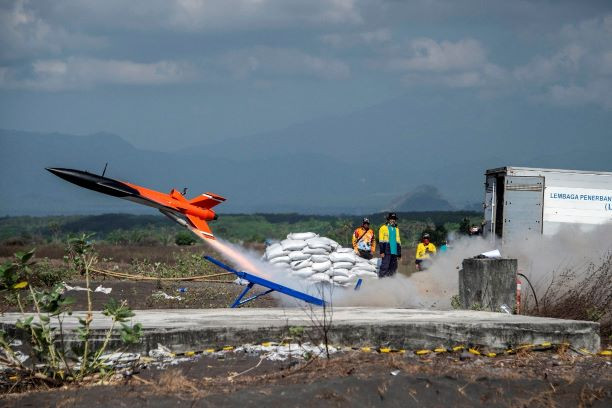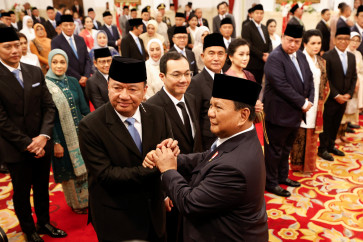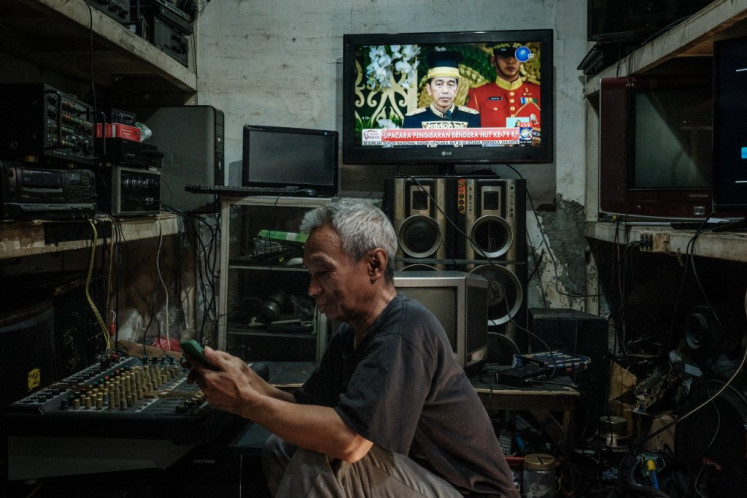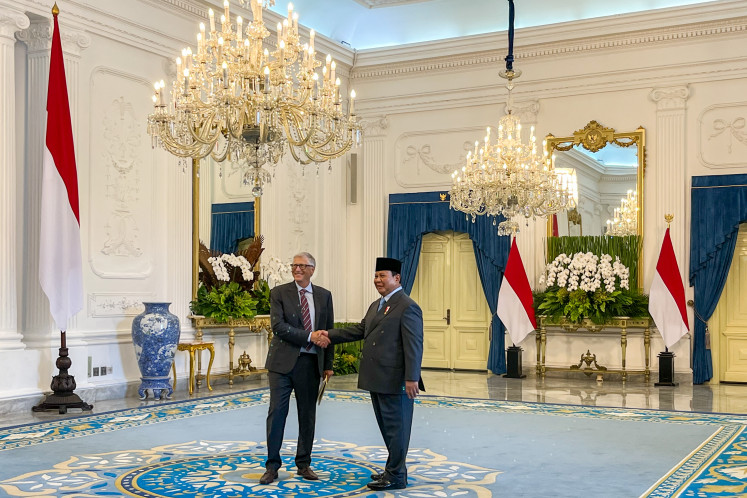What’s next for the Indonesian space program?
The establishment of National Research and Innovation Agency (BRIN) under the direct supervision of the President has created an unprecedented chance to bring the space agenda onto the highest table of Indonesian officials.
Change text size
Gift Premium Articles
to Anyone

T
he internationally recognized Indonesian space agency, the National Aeronautics and Space Institute (LAPAN), no longer exists. As of September last year, it had been amalgamated into the National Research and Innovation Agency (BRIN).
BRIN is still in a difficult yet necessary integration process to accumulate all national agenda items and resources for research and development. The aerospace and nuclear sectors are not excluded, even though each has its own legal basis to be taken care of by independent entities.
On one hand, it can be seen as a streamlining move to enhance overall Indonesian technological prowess, but on the other hand, it can also be interpreted as a major drawback for Indonesian space development.
LAPAN was one of the earliest space agencies on Earth. It was established by founding president Sukarno in 1963 with a spirit to adapt to the dawn of the space age era and stand equal with other nations. His conviction about the “outer space revolution” at the time was visionary for a nation that was still building stability.
Through LAPAN, Indonesia turned into one of leading space research and development centers in the Asia-Pacific. Now, while other countries of this region start creating their long-overdue space agencies, Indonesia is choosing to reset it.
A strong basis for challenging the integration of LAPAN into BRIN is Law No. 21/2013 on space activities, which mandates a government body to conduct government affairs in aerospace research, development and utilization, as well as space activities. To implement the mandate, Presidential Regulation No. 45/2017 on the master plan for space activities was issued with a vision to operate Indonesian-built telecommunications, observation and navigation satellites and launch an indigenous micro-satellite launch vehicle into low-Earth orbit by 2040.
LAPAN was expected to turn Indonesia into a spacefaring nation, joining the elite “space club” by 2045.
BRIN was established based on Presidential Regulation No. 78/2021 to implement three laws at once: Law No. 10/1997 on nuclear energy, Law No. 21/2013 on space activities and Law No. 11/2019 on national systems for science and technology.
It is agreeable that the research and development parts of the Nuclear Energy and Space Activities Law could be integrated. But their activities and governance will be too big a burden for a single entity like BRIN.
To make matters worse, the current aerospace representation in BRIN reflects some potential incoherence problems. This should not be an issue because every single unit of BRIN should bear all Space Activities Law mandates. However, BRIN has recently formed the Indonesian Space Agency (INASA), an ad hoc body.
The new “space agency” retains Indonesia’s face in the global arena but with reduced authority compared to that of LAPAN. Its main job is to deal with multilateral space forums, something that can be typically done by BRIN’s secretariat bodies. Aerospace research and development now falls under the Research Organization of Aeronautics and Space (ORPA), another BRIN unit.
In a more technical aspect, BRIN renegotiated a very strategic cooperation scheme involving itself, the Research Center of Rocket Technology of ORPA and the China Great Wall Industry Corporation (CGWIC).Initially, both agreed to codevelop a sounding rocket for atmospheric research purposes.
The partnership was a result of LAPAN’s hard work in accelerating the transfer of rocket technology. The Supreme Audit Agency, however, found the move had a “risk of failure”, prompting the BRIN head to form a task force to address the BPK finding.
Those issues, however, should not be the only considerations in deciding whether this integration is good or bad. In fact, the old arrangements and practices failed to significantly lift up Indonesia’s space capabilities in nearly the last six decades. Problems of resource scarcity, redundant national agendas and the ever-changing global space development arena justify the need to reconcile space with all sectors comprehensively.
Through the integration, LAPAN was not only absorbed by BRIN, but also absorbed BRIN. LAPAN’s manpower and resources now belong to BRIN, yet some might not realize that today former LAPAN people can access all national research and development capacity under BRIN. For instance, building rockets relies on advanced manufacturing technologies which were not LAPAN’s main capacity. Now, ORPA and the Research Organization of Energy and Manufacture (OREM) can collaborate seamlessly by sharing their expertise and facilities.
On top of the internal gains, the establishment of BRIN under direct supervision by the President has created an unprecedented chance to bring the space agenda onto the highest table of Indonesian executives. BRIN head Laksana Tri Handoko has regularly attended Cabinet meetings with President Joko “Jokowi” Widodo and his ministers.
This is a big opportunity to put outer space development into the mainstream national development agenda. Not only could it secure political and financial support for BRIN, it could also influence other government sectors to invest in space research cooperation with BRIN.
The government’s priorities on economic development are also in line with the latest trends in global space activities. The prestige reasoning behind the birth of LAPAN lost relevance because both first movers and late comers in this field tend to aim for economic benefits from space explorations.
Thus, alongside BRIN’s momentum to gather more private participation in research and innovation, the space sector in Indonesia could reinvigorate its agenda to match the present reality in order to maximize the return on investment for Indonesian prosperity.
Those aspirational thoughts may get the benefit of the doubt. However, they can only be achieved by having some preconditions to overcome the challenges.
First of all, BRIN should really embody the space agenda into all of its functional units – explicitly. As ORPA takes a more technical part, a management-orientated INASA could play a role in it. Yet true transformation requires more of BRIN as a whole, so the existing Indonesian space arrangement would not be seen as a reduced version of LAPAN. The BRIN head should fully take into account this space obligation as an inseparable part of his job.
Afterward, the government should actively engage with domestic and international partners with its new course of action in outer space affairs. Before anything, a space activities master plan should be incorporated into a larger development agenda. The new intentions then must be clearly communicated to regional/local governments and domestic private actors, such as in the development of spaceports and a national observatory.
After that, diplomatic measures with other governments and business partners abroad should be initiated and maintained toward a more conducive global space governance and global space value chain.
More importantly, aiming for Golden Indonesia 2045 without considering its space element constitutes a major drawback. Outer space has become geoeconomically and geopolitically more important than ever. Outer space business is a global-scale industrial ecosystem, so the highest national leadership should take a significant part in maintaining the master plan’s implementation.
With 2045 in his vision and an aspiration to build tol langit (sky toll) as future infrastructure, President Jokowi could add this space leadership as another solid item of his legacy. We can imagine the next generations will be proudly watching space launches at the Indonesian space center in Biak, Papua.
***
Deden Habibi Ali Alfathimy is a policy researcher at the National Research and Innovation Agency (BRIN) who focuses on outer space policy. Adhimantara Ibnu Nugraha is a policy analyst at BRIN and secretary of the Indonesian Space Agency (INASA). The views expressed are their own.









